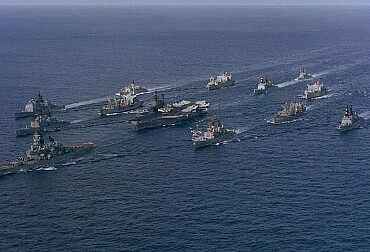Russia no longer controls the Black Sea. In four months it has lost a fifth of its fleet
In recent months, Ukraine has achieved significant success in weakening Russia's control over the Black Sea, particularly its Black Sea Fleet, which has been instrumental in Russian attacks on Ukrainian territory. While Russia's ongoing attrition warfare in the east continues, its dominance in the Black Sea has come under scrutiny. This article explores the recent developments in the Black Sea region and the challenges faced by both Ukraine and Russia.

Loss of naval power
The British Defense Minister, Grant Shapps, recently commented on the diminishing Russian presence in the Black Sea. He pointed to the destruction of the Russian landing ship Novocherkassk in the port of Feodosia on the occupied Crimea as a clear indicator of Russia's dwindling naval power. According to Shapps, Russia has lost a significant portion of its Black Sea Fleet in the past four months.
The attack on the Novocherkassk took place on the night of December 25th, when Ukrainian forces launched precision-guided missiles from aircraft. These missiles, provided by Ukraine's allies, caused substantial damage to the ship, triggering a fire in the port. The Novocherkassk was carrying ammunition imported from Iran, and its proximity to Feodosia, a known launching point for Russian drones targeting Ukrainian cities, raised concerns.
The toll of the attack
Initially, Russian authorities downplayed the attack, reporting one fatality and four injuries. However, subsequent reports from an independent Russian Telegram channel, Astra, contradicted this narrative, stating that 19 sailors were injured, and 33 others were missing. This incident mirrored the sinking of the cruiser Moscow, the flagship of the Russian Black Sea Fleet, on April 14, 2022, highlighting the shrinking size of the Russian fleet.
Ukrainian efforts to sink the Novocherkassk date back to March of the previous year when they attempted to do so in the port of Berdiansk. The ship, which measures 113 meters in length and was originally built for the Soviet Union between 1975 and 1991 in Polish shipyards, was primarily designed for ocean operations.
Challenges in eastern Ukraine
While Ukraine celebrates its successes in the Black Sea, there are less optimistic reports from the eastern frontlines. Shortly before the Novocherkassk incident, Ukrainian forces were forced to withdraw from the town of Marinka in the Donbas region. Chief of the Ukrainian army, Valeriy Zaluzhny, likened the month-long battle for Marinka to the devastating fight for Bachmut, which Russian forces completely obliterated.
The situation in Marinka echoes that of Bachmut, with Ukrainian soldiers facing intense street-to-street fighting. Zaluzhny acknowledged the grim reality of the situation, stating that while every inch of Ukrainian soil is crucial, the lives of Ukrainian fighters take precedence.
Russia employs a different strategy in its attrition warfare, relentlessly attacking Ukrainian positions at the cost of high human casualties. According to Ukrainian sources, Russia has lost over 355,000 soldiers since the beginning of the invasion.
The recent destruction of the Novocherkassk and Russia's continued losses in the Black Sea suggest a shift in the regional power dynamic. Ukraine's success in challenging Russian naval dominance is a significant development. However, the challenges on the eastern front in Donbas continue to test Ukraine's resilience. Marinka's loss highlights the high stakes involved in this conflict and underscores the determination of both sides in the ongoing struggle for control and influence in Eastern Europe.








